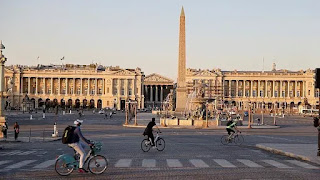As I said on Saturday, and in earlier posts, if any municipality is serious about getting people to ride bikes rather than drive to work or school, or for fun, building bike lanes is just one step.
And it’s a legitimate step if and only if (See what I learned in my formal logic class?) those lanes are well-designed, -constructed and -maintained—and practical.
On that last condition: Building bike lanes that begin and end in seemingly-arbitrary locations, without any markers or any other indicators, serves no one. People will give up four wheels for two if, among other things, bike lanes actually connect places people ride to and from, safely. Of course, I don’t mean that people should have lanes directly from their front doors to their desks or work stations. But bike and pedestrian paths should make it possible to go from, say, a central point in a residential neighborhood to a business or cultural district in the way of good mass transit systems—like, say, the one in Paris.
 |
| Photo by Ludivic Marin, for Agence France Presse |
Apparently, the City of Light’s Mayor, Anne Hidalgo, has such a vision. She won a second term last June on a platform that included making Paris a city “tout á velo”—totally cycleable—by 2026. To that end, the French capital is investing 250 million Euros to improve its cycling infrastructure.
Among other things, 52 km (about 32 miles) of “coronapistes”—temporary lanes created during the pandemic—will be upgraded and made permanent. To that, another 130 km will be added to the existing 100 km. These additions and upgrades will make it possible to cycle from one end to another, and to and from key locations, within the city as well as in the adjacent suburbs.Even more important, those lanes will be planned to make it safer for cyclists to cross intersections, thus addressing another concern of people who say they’d consider cycle commuting but worry about safety.
Hidalgo’s plan will also address another concern—bike theft—by adding 100,000 new secure parking spaces, including 1000 for cargo bikes.


